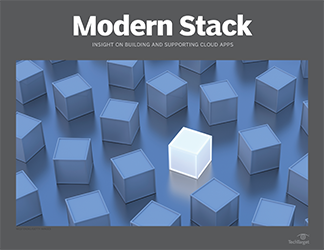PRO+ Premium Content/Modern Stack
Access your Pro+ Content below.
Microservices development will fail with monolithic mindset

This article is part of the Modern Stack issue of August 2018, Vol. 1, No. 3
As monolithic applications become barriers to business agility, many organizations are breaking them down into microservices that are independently scalable and thus more cloud compatible. In theory, microservices development should be simple -- at least when compared to building traditional monolithic apps. It's logical that small dev teams plus smaller apps and faster deployment would equal greater business agility. That equation, however, doesn't add up when organizations stick with traditional development approaches and technologies that don't fit the unique requirements of microservices. Microservices development brings some common traps, and teams coming from monolithic application backgrounds may be caught off guard, said Bartosz Jedrzejewski, lead developer for UK consultancy Scott Logic. Monolithic approaches to DevOps and configuration and dependency management, for example, often fail to handle the diversity and large number of microservices. Tools for building, deploying and managing microservices are available, but ...
Features in this issue
-
Microservices development will fail with monolithic mindset
Enterprises that build microservices with traditional development tools and practices can run into problems in configuration and dependency management.
-
Most jobs in the IT industry pay well, but skills matter
A survey of tech professionals identified which IT skills are most in demand. Find out how salaries compare from region to region, and how expertise affects compensation.
Columns in this issue
-
-
Emotional intelligence in the workplace makes a difference
Technologists need to know people as well as they know their craft. Applying emotional intelligence in the workplace helps convey ideas and change organizations.
